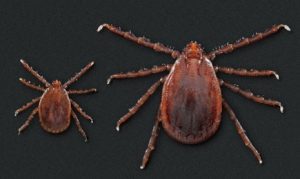WHAT WILL 2019 BRING US PEST-WISE?
By Chris Williams on January 2, 2019.
Well, it’s time to welcome 2019 and begin to speculate on what our primary pest problems will be in the New Year. Much of it depends on what happens in the remainder of this winter.
WINTER TEMPERATURES AFFECT PEST SURVIVAL
Our weather will have an effect on the numbers of mosquitoes, and ticks, and flies, and other creatures that will bite us and annoy us come spring. An extremely cold winter will almost certainly decrease the numbers of certain pests that spend the winter sheltering. They can take a certain amount of cold since their bodies contain a type of antifreeze, but it’s often the thawing and refreezing that kills overwintering insects.
Warmer winter temperatures also mean that the more tropical and subtropical insects and ticks are no longer restricted to the warmest, southern parts of the U.S. They have been gradually moving northward into new regions…and taking their diseases with them. We are finding mosquito species in New England that were never able to survive here before.
WARMER WEATHER MEANS MORE DISEASE TRANSMISSION
The length of the winter is important, too. If there’s an early spring, insects become active earlier, start feeding and reproducing earlier, and may, therefore, produce more offspring during the season. If the weather remains mild well into fall, insects can stay active longer before they have to worry about hunkering down for the winter. This extended season is especially important when it comes to biting insects that can spread diseases to people because it gives them even longer to do so. At least some of the increase in numbers of people infected by Lyme and other pest-transmitted diseases is because of the longer biting season.
All of this can be attributed, at least in part, to climate change. As long as we remain on a weather roller coaster with flooding and droughts and temperature extremes, we can expect pests to accompany us on the ride. Some won’t survive the ride or the weather, but the hardy ones will survive to torment us and bite us and maybe infect us in 2019.
BITING PESTS WILL BE OUR BIGGEST CONCERN IN 2019
As far as individual pest predictions, our standard indoor pests like the German cockroach will always be with us. Weather extremes have little effect on them. Bed bugs continue to be important even a decade after their resurgence but people are now more aware of this pest and professionals know better how to manage it. But by far, the biggest pest concerns throughout the U.S. in 2019 will continue to be mosquitoes and ticks and the debilitating diseases that they can transmit.
AND GUESS WHAT? THERE’S A NEW TICK IN TOWN!

Asian Longhorned Tick. CDC
New invasive species frequently make their way into the U.S. The latest of concern is yet another tick species, the Asian longhorned tick, that has already been found in several eastern seaboard states and is rapidly spreading. These ticks are primarily a threat to livestock, but in Asia they transmit disease to humans. The CDC considers the presence of this tick in the U.S. as a “new and emerging disease threat.”
We also regularly discover new diseases that our established mosquitoes and ticks are now transmitting, or we discover that an established species is now transmitting a familiar disease that we previously thought it wasn’t capable of transmitting.
So, make a resolution: stock up on repellent, take precautions against mosquito and tick bites, and remember to check children and pets for ticks.